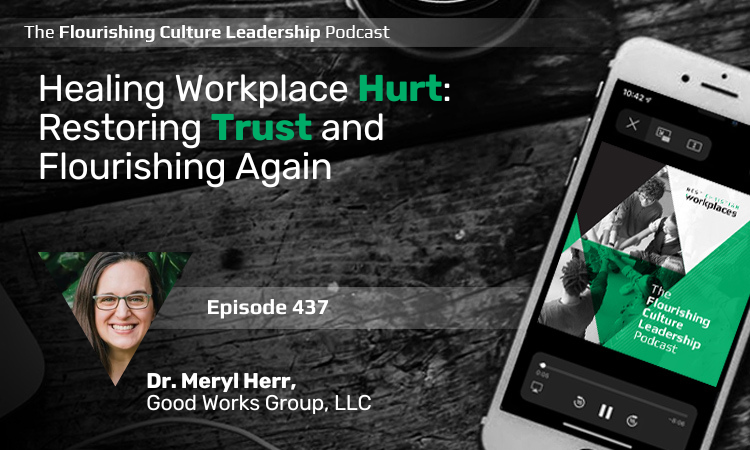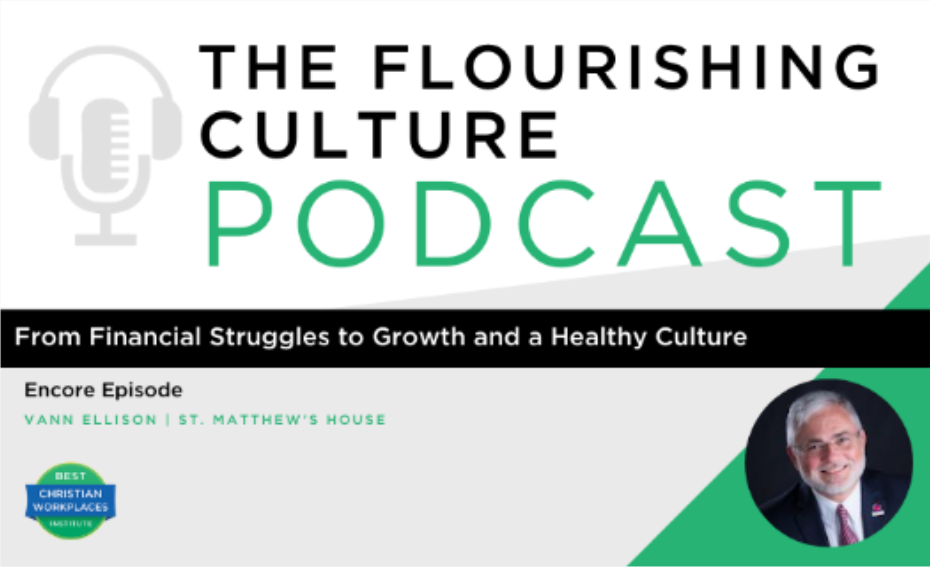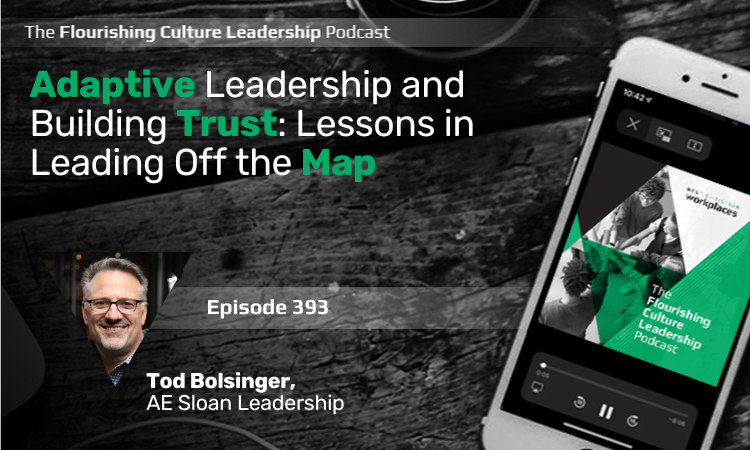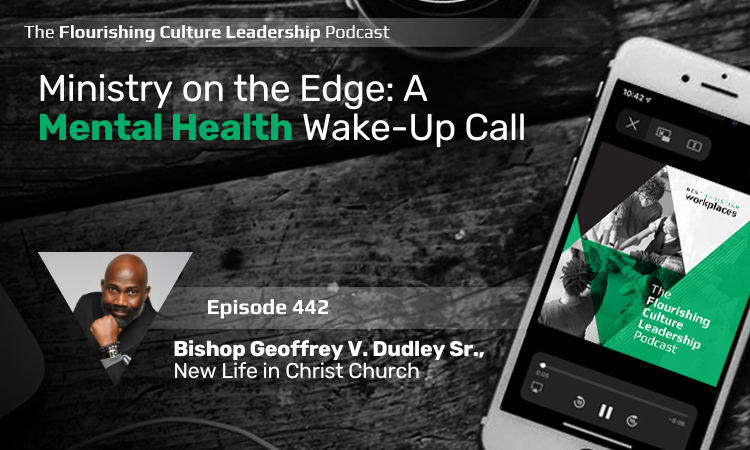4 min read
437: Healing Workplace Hurt: Restoring Trust and Flourishing Again
 Best Christian Workplaces
:
April, 07 2025
Best Christian Workplaces
:
April, 07 2025

Workplace hurt is real, but it doesn’t have to be the end of the story. In this episode, Dr. Meryl Herr, author of When Work Hurts, shares how leaders can process pain in a faith-centered way, foster emotional and spiritual healing, and build a culture of trust and resilience.
Listen to the Audio
Listen in Apple Podcasts | Listen in Spotify | Listen in YouTube Music
In this episode:
Inspiration Behind When Work Hurts
• Dr. Meryl Herr was inspired by Nehemiah 3, which depicts diverse workers uniting for a common goal. (04:15)
• Initial curiosity about this Scripture led to further study and later connected with personal experiences of work hurt. (04:30)
• The book aims to provide:
• Solidarity – Readers are not alone; includes stories and statistics on workplace hurt. (05:37)
• A Challenge – Encourages people to process their pain rather than carry it. (06:03)
• Encouragement – Work hurt does not define a person; healing and hope are possible. (06:53)
Moving from Work Hurt to Emotional Health
• Dr. Herr differentiates between work hurt and emotional health. (08:20)
• Steps toward healing:
• Acknowledge the pain – Recognize and articulate what happened. (08:48)
• Bring it to God – Use prayer, especially lament, to process hurt. (09:26)
• Seek community support – Find empathetic listeners who validate the pain. (09:48)
• See the bigger picture – Understand work hurt as part of God’s redemptive story. (10:22)
God’s Purpose in Work Hurt
• Work hurt can prepare individuals for future opportunities. (10:52)
• Nothing is wasted in God’s economy; even suffering can be used for good. (11:38)
Supporting Employees with Work Hurt
• Some employees bring past workplace hurt into new roles. (12:31)
• Managers can foster a healthy work environment by:
• Building trust through care, compassion, and integrity. (13:42)
• Understanding employee needs by asking about work styles and preferences. (14:22)
• Observing behavior for signs of unresolved pain, such as anger or defensiveness. (15:05)
Handling Difficult Workplace Exits with Compassion
• Leaders should ensure they have exhausted all options before resorting to layoffs, including cost-cutting measures and performance improvement plans. (18:39)
• When terminations are unavoidable, approach the conversation with empathy—acknowledge the personal and financial impact on the employee. (20:23)
• Frame the message with care, expressing regret and understanding rather than delivering a blunt dismissal. (21:41)
• Organizations can continue supporting employees post-termination through: (22:05)
• Reskilling and upskilling opportunities. (22:19)
• Internal job placement within the organization. (22:26)
• Networking assistance, resume help, and job search support. (22:32)
The Impact of Layoffs on Workplace Culture
• Poorly handled layoffs create lasting organizational trauma, affecting employee morale and trust. (24:04)
• Transparent and compassionate communication is key to maintaining trust among remaining staff. (24:43)
• Employees appreciate when terminations are handled with dignity, reinforcing a workplace’s Christian values. (24:59)
Leadership Self-Awareness and 360 Assessments
• Leaders often have blind spots that affect their team, making self-awareness crucial. (25:54)
• 360 assessments can provide well-rounded feedback, but they must include diverse perspectives—not just from supporters. (26:12)
• External facilitation can improve the effectiveness of these assessments by ensuring honest and balanced input. (26:38)
Flourishing Leadership and the Role of Support Systems
• Leaders cannot flourish in isolation; they need support from mentors, spiritual directors, therapists, or coaches. (28:49)
• Research from the Max De Pree Center for Leadership highlights the importance of seeking external feedback and guidance. (28:36)
• Peer discussions and trusted advisors help leaders navigate challenges and grow in their roles. (29:15)
Flourishing Leaders Research
• Conducted at the Max De Pree Center for Leadership at Fuller Seminary. (32:22)
• Key finding: Flourishing leaders are deep disciples of Jesus. (32:59)
Abiding in Christ
• Beyond reading about Jesus—develop a real relationship with Him. (33:12)
• Drink deeply from Scripture to understand God’s values. (33:19)
• Reflect regularly on personal values and alignment with God’s Spirit. (33:29)
Developing Strong Values
• Focus on 2-3 core values at a time for intentional growth. (33:42)
• Rebecca Johnson’s “values deck” helps individuals identify key values. (33:49)
• Example: Prioritizing kindness and generosity in leadership decisions. (34:18)
Applying Values in Leadership
• Integrate values into KPIs, one-on-one meetings, and performance evaluations. (34:50)
• Align organizational policies with stated values. (35:08)
• Address conflicts when personal and organizational values differ. (35:20)
Organizational Character & Integrity
• Organizations should define and consistently act on their values. (35:34)
• Authentic alignment between values and actions builds credibility. (35:43)
• Inconsistencies between stated values and decisions cause concern. (35:56)
Max De Pree’s Legacy
• Known for consistent character across all areas of life. (36:25)
• A model for integrating faith and leadership authentically. (36:38)
Workplace Well-Being and Mental Health Support
• Employee Resource Groups (ERGs) provide community and solidarity, especially in large organizations. (37:38)
• Workplace chaplains offer spiritual care and support for employees facing challenges. (38:15)
• Comprehensive mental-health benefits, including stipends beyond insurance, help employees access necessary care. (38:42)
• Christian organizations should be mindful of the risks of burnout, secondary traumatic stress, and compassion fatigue, especially for those in caregiving roles. (39:42)
Workplace Policies for Employee Flourishing
• Generous PTO policies ensure employees have time to rest, reflect, and care for their well-being. (40:07)
• Realistic workloads prevent burnout and align with the concept of sustainable productivity. (40:52)
• Organizations should reevaluate productivity expectations, especially for knowledge workers. (41:04)
The Critical Role of Management Training
• Many industries lack effective manager training beyond basic HR compliance. (41:39)
• Training should be interactive, involving retreats, workshops, and real-world application. (42:43)
• Managers must be equipped to foster a healthy workplace culture, not just enforce policies. (42:27)
Final Reflections on Leadership and Workplace Culture
• Integrity and consistency in values are essential for leaders. (44:47)
• Leaders should be self-aware and develop patterns of health to navigate difficult workplace situations.
• The book When Work Hurts offers insights for employees and managers to better understand and address workplace harm. (45:03)
• Building a flourishing workplace culture requires ongoing learning, awareness, and commitment from leadership. (45:15)
Read the Transcript
Read a complete, word-for-word transcript of the episode
FOLLOW OUR HOST
Follow our Host, Al Lopus, on LinkedIn & Twitter.
Email our host at al@workplaces.org

Encore Episode: From Financial Struggles to Growth and a Healthy Culture
We hear today's leaders ask, "How can we build spiritual and emotional well-being of our employees?" Vann Ellison, President and CEO of St. Matthew's...

393: Adaptive Leadership and Building Trust: Lessons in Leading Off the Map
Join us on the Flourishing Culture Leadership Podcast as we explore essential tools for leading change with Tod Bolsinger, author and executive...




